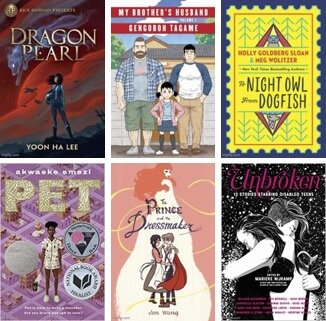Inclusive Literature at Yokohama International School
Katy Jean Vance
Over my career, I have been fortunate to never experience a book being banned on a school level. The inclusive environments of these schools weren’t accidental; they’re the result of efforts by supportive administration, passionate teachers and empowered students. I have, however, faced book banning efforts on a larger professional scale.
Most recently, I was a librarian in Japan, where same sex marriage STILL isn’t legal despite years of work by local and international activists to pass the Equality Act. Yokohama International School (YIS) has a thriving LGBTQ+ Human Rights Club, enthusiastic participation in the annual Tokyo gay pride parade, a diverse library collection, and a new Supporting Transgender and Non-Binary Students policy developed with input from members of the LGBTQ+ student group.
Despite being a school that models many ways for LGBTQ+ inclusion, our students are still living in a country where members of the ruling political party are spreading hateful rhetoric about LGBTQ+ people and LGBTQ+ people aren’t living with the same rights as their straight, cis-gender peers. That is why it is essential that our students see positive, authentic, and varied representations of LGBTQ+ lives in their lessons, teachers, and books.
I’m proud of the role the library plays at YIS in making an inclusive community for kids. Check out a sample of our secondary school LGBTQ+ collection on our catalog, and peruse our #hsbookoftheday and #msbookoftheday tweets to see how we feature LGBTQ+ authors and characters in our students' reading lives. In my role as librarian, I regularly included LGBTQ+ people, books, and issues in our reading visits, tutor sessions, and my collaborative research lessons. I’m grateful to the community of teachers and administration at YIS that make it an easy place to celebrate LGBTQ+ books and people. But I am perhaps more proud of my activism within the Japan Librarians group, a professional group of librarians from international schools of all kinds around Japan, including International Baccalaureate, country specific, religious, for profit, and independent non profit schools. It is a largely harmonious group: we work together to grow as professionals, share resources, and encourage reading for pleasure in English and Japanese.
The biggest task of this group is the year-long selection of books for the annual Sakura Medal competition. This yearly list and its related events, such as the Book Bowl and Art competition, involve dozens of schools and reach thousands of children. Over the course of the school year, participating librarians and student library councils nominate a range of titles and meet in the spring to narrow down the selection. For a few years, one of the deepest sources of conflict was over the inclusion of books with LGBTQ+ characters. Several librarians, mostly from religious schools, requested that we not include any books with potentially offensive content, including “language,” drug use, sex, and, most adamantly, LGBTQ+ characters. Their reasoning is that we should choose books that are okay for everyone, and since their schools won’t include books with LGBTQ+ characters in their library collections, their schools shouldn’t be excluded from reading the whole list. For several years in a row, I and a few other librarians explained why this reasoning was not only flawed but harmful to all children. As Dr. Rudine Sims Bishop famously said,
“Books are sometimes windows, offering views of worlds that may be real or imagined, familiar or strange. These windows are also sliding glass doors, and readers have only to walk through in imagination to become part of whatever world has been created and recreated by the author. When lighting conditions are just right, however, a window can also be a mirror. Literature transforms human experience and reflects it back to us, and in that reflection we can see our own lives and experiences as part of the larger human experience. Reading, then, becomes a means of self-affirmation, and readers often seek their mirrors in books.”
If we only include books with straight cisgender characters, we are not only excluding our students who are part of the LGBTQ+ spectrum, we are excluding those who have LGBTQ+ family, friends, and teachers (Ahem. That’s everyone!). We’re also not allowing straight, cisgender students a window of understanding into the lives of their LGBTQ+ peers.
In addition, we shared research about how LGBTQ+ youth are more likely to contemplate suicide, experience depression, and feel unsafe at school than their straight cisgender peers. The 2018 HRC Youth Report shares the horrifying experiences of LGBTQ+ students. It’s not tough to make a connection between schools that purposely exclude any LGBTQ+ characters or topics from their largest reading program and LGBTQ+ students and allies feeling unsafe, unwanted and unwelcome in their schools.
For these librarians and their schools, that wasn't enough. So, after speaking with my administration, I said that if the group decided to ban books with LGBTQ+ characters, YIS would be exiting the Japan Librarians professional group, Sakura Medal Book Bowl, and larger medal competition. I also made it clear that we would not exit quietly, explaining to both our school community and the larger Japanese international school community why we had chosen to leave the group. Several other librarians in the group took this same stand. Since then, books with queer characters have been included on the list without objection. Some of the librarians who wanted to ban titles said to colleagues that they felt unfairly stigmatized for representing the views of their schools, saying that it’s not their personal choice, but their school’s choice. I understand that not all people are in a position of privilege to choose where they work and sometimes people have to work at a school that doesn’t align with their personal values. That said, if you disagree with your school’s values, then fight that battle at your school. Don’t bring your school’s discriminatory, homophobic views to my students.
Did this solve everything? No. Librarians can still choose not to purchase books with content they feel doesn’t align with their school’s values. But the official list, the one publicly available online, available to any student or parent with access to the internet? It has included titles like My Brother’s Husband (the most popular graphic novel amongst 6th grade boys this past year!), PET, Unbroken: 13 stories starring disabled teens, The Prince and the Dressmaker, To Night Owl from Dogfish, and Dragon Pearl. LGBTQ+ students and allies in international schools all across Japan are being seen.
While there are many educators across North America who understand that all students need to see LGBTQ+ characters and authors represented in their classrooms and libraries, not all of them are as fortunate as I have been to have supportive school communities and healthy budgets. If you’re facing a similar prejudice in your school or district, I hope this will encourage you to search out like minded colleagues and work together to stand for change. I also hope readers in the position to do so will support children and educators by participating in Pride and Less Prejudice’s “Banned Together Annual Virtual Auction” this fall. Finally, thank you to the Pride and Less Prejudice team for their important work and for allowing me to share my story.
Katy Jean Vance has worked as a librarian in Yokohama, Japan at Yokohama International School; Luanda, Angola at Luanda International School; and Greensboro, USA at Lakewood Montessori Middle. After spending over a decade abroad in international schools, Katy is back in America reading books that are GAY GAY GAY to her beautiful niblings. You can connect with her on Twitter and Goodreads.



